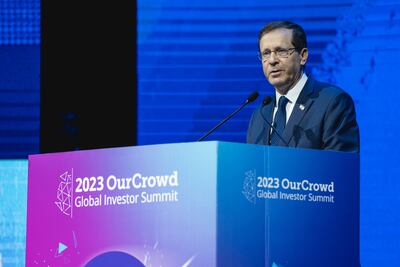Companies from across the Middle East were in Jerusalem on Wednesday to showcase the vast economic potential in the region two years after the signing of the Abraham Accords.
Opening the OurCrowd Global Investor Summit, Israeli President Isaac Herzog extended “a particular thank you to Abraham Accord countries”.
Just outside the room, the pavilions of Abu Dhabi and Morocco were centre stage as thousands of potential investors from more than 80 nations came to learn more about business in the Arab world.
The Abraham Accords, which were signed in 2020, normalised relations between Israel, the UAE, Bahrain and Morocco, with Sudan making a significant start to the process.
As well as being a historic geopolitical and strategic shift, the deal opened up new trade corridors between some of the region’s most successful economies.
Just one year after the move, the value of trade between the Emirates and Israel reached more than $1.1 billion.

Ahead of the conference, Jon Medved, one of Israel’s leading venture capitalists, described how the Accords provided the private sector “political air cover” for business and investment to further implement the spirit of the deal, “to promote inter-faith and inter-cultural dialogue to advance a culture of peace among the three Abrahamic religions and all humanity”.
Abdulla Abdul Aziz Al Shamsi, Director General of Abu Dhabi Investment Office, told a crowd of hundreds that “we have really started to see the fruits of this work”. It was his first time in Jerusalem.
Keen to stress that the Accords mean more than relations between its signatories, Sabah Al Binali, the first Emirati partner at an Israeli company, spoke to The National of his personal experience bridging these two worlds.
“It’s overwhelmingly positive … I think after the initial excitement, people are settling down and putting their business hats on,” he said.
The summit was a hopeful event for Israel as it goes through one of its most divisive eras in decades, in which the country’s new government, led by Prime Minister Benjamin Netanyahu, attempts to push through deeply controversial judicial reforms.
Speaking at the conference, Mr Herzog called for Israelis to come together and reach a compromise.
“The Israelis taking an active role in the debate from all of its sides. All I can say about myself is that I'm doing my best to direct this debate into a constructive dialogue that will lead to an agreed-upon result that will strengthen and foster and protect Israeli democracy,” Mr Herzog said.
The slogan of this year’s conference was “Startups: Saving the Planet.” With the urgency of the climate crisis looming large at the gathering, Mr Medved keen to see beyond politics: “Today, we have bigger fish to fry.”
But some in Israel's vital tech scene are concerned.
On Monday, as streets around Israel's parliament ground to a halt amid mass protests over the reforms, Erel Margalit, founder of Jerusalem Venture Partners, told The National: “Over the past 25 years, we in the high-tech industry have been builders at home and abroad. An open society was critical to that. Many of these builders that are leading Israel’s economy are now saying, 'don’t change our ways of life'.”
Recently, there have also been geopolitical differences between the UAE and Israel.
In January, the Emirates called for a UN Security Council meeting after Israel’s national security minister Itamar Ben-Gvir visited the Al Aqsa Mosque compound in Jerusalem, a move that was criticised as offensive and destabilising across the Arab world.
But in terms of the private sector, co-operation is still gaining momentum and real commercial goodwill was on full display in Jerusalem.
For Mr Al Binali, this means more than just good business, but also real cultural dialogue.
“I was once visiting one of the government institutions in Abu Dhabi. On one side of the room were Emiratis, and on the other me and a number of Israelis. My colleague was trying to explain Israeli business culture, and he said ‘we have a word in Hebrew that exists in no other language: ‘takhles.’
“Everyone on the other side of the table started cracking up. It exists in Arabic, too: ‘takhlis,’ meaning ‘get it done’. It showed our personal and social values are actually very similar.”


